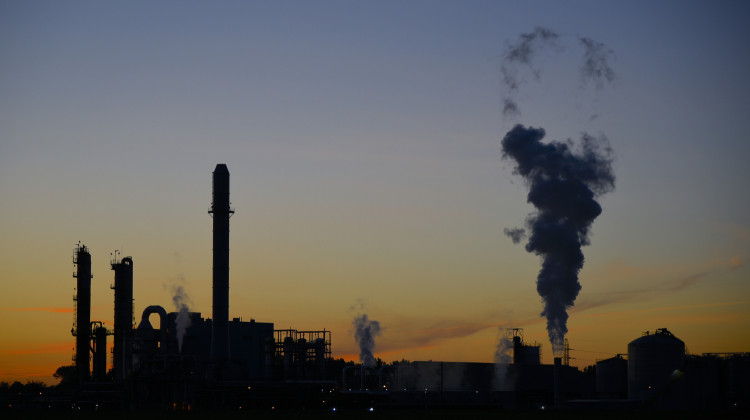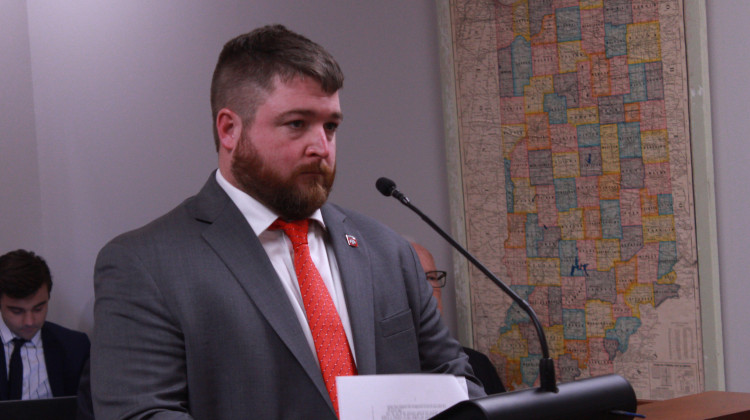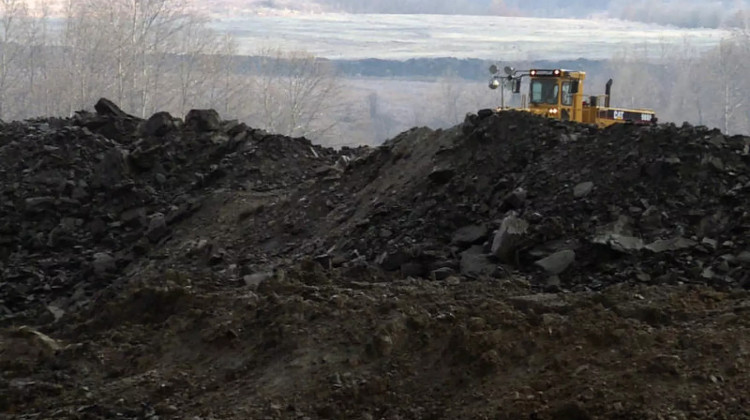Indiana recently released its initial plan to reduce greenhouse gas emissions with the help of a federal grant.
But members of our audience said climate and energy issues haven’t played a prominent enough role in the campaign for governor.
Here’s what the state’s six Republican gubernatorial candidates say about the issues:
Doden said the question is really about energy, saying the state needs “reliable, on-demand energy.”
“And every time we take coal plants down without an on-demand replacement, we're putting our energy both at risk but also raising potential of having to buy it off the national grid and then pay higher prices for energy,” he said.
Doden said he would create an executive order that no company can retire a coal plant without a reliable, on-demand replacement online. He also looks forward to Indiana exploring nuclear microreactors.
On wind and solar energy, Doden said he’s a believer in “home rule,” allowing local communities to make their own, independent decisions.
Hill said humans “probably” have an impact on climate but that explorations of alternative energy sources and “net-zero” carbon emission policies are “overinflated.”
“The notion that we're having an immediate need to reduce carbon, I think is a dangerous fear factor,” Hill said. “I think that the folks who I've talked to are very concerned about making sure that our energy production remains independent.”
READ MORE: Have trouble understanding climate trends in Indiana? A climatologist gives their tips
A majority of Hoosiers believe in climate change.
Reitenour said there’s not a lot of research that supports solar and wind energy as alternative energy options. The U.S. Energy Information Administration said solar and wind will lead national power generation growth for the next two years.
Reitenour said she wants to have a “real green conversation” that’s focused on hydroponics.
“I would love to see hydroponics on the rooftops of these buildings in the city. I would love to see parking lots that aren't being used turned into gardens,” Reitenour said. “I think it would be very beneficial for children — gardening and green in the city is healthy. And the principle of you reap what you sow is a principle that will go a long way for our children.”
Reitenour said she also wants to work with farmers to help better educate children and get students in schools into apprenticeships in the agriculture sector.
U.S. Sen. Mike Braun (R-Ind.):
Braun was the co-chair of the Climate Solutions Caucus and said he spoke to a group of young conservatives at a conference in Indiana on the need for conservative solutions to environmental issues.
“Because if you're not in the conversation, you're going to be on the menu in terms of the consequences of it,” Braun said.
Braun said he wants to see an “all of the above” energy strategy.
“The cleanest, least expensive fuel should win the day, regardless of what the people in the business want to push,” Braun said.
Braun said the state needs to ensure it doesn’t push too far on alternative energy sources and risk not having enough energy for its needs. He also voiced concern about the rising cost of electricity in Indiana.
Join the conversation and sign up for the Indiana Two-Way. Text "Indiana" to 765-275-1120. Your comments and questions in response to our weekly text help us find the answers you need on statewide issues and the election, including our project Civically, Indiana.
Chambers said the state needs a strategy for energy transition, calling it a “competitiveness” and “affordability” issue.
“What we don't want to do is be way out ahead on this issue like Texas was, and create a system where it's unstable and unaffordable,” Chambers said.
Chambers said he’s concerned about “overreach” by the federal Environmental Protection Agency driving up costs for Hoosiers.
“And so we need a real fighter in the governor's office to balance the need for alternative energy sources with the need for stable, reliable, dependable energy sources,” Chambers said.
Chambers said “all sources” are important, mentioning gas, coal, wind, solar, hydrogen and potentially small nuclear.
Crouch said as governor, she will ensure Indiana has a state water plan that looks at both quantity and quality.
“We have to look at not only plans to know where our assets are, but we've got to determine how to make them better,” Crouch said. “And as secretary of agriculture, I'm proud that our community has gone from 600,000 acres of cover crops to 1.6 million acres of cover crops.”
Crouch said the warming climate also causes concerns for algae production, which can harm waterways — another reason, she said, it’s vital to have a state water plan.
She said she’s also focused on helping communities who’ve been hurt by pollution, connecting them with resources at both the federal and state government levels.
“But then, how do you hold those companies responsible for the damage that they did 30 years ago?” Crouch said. “And so, yes, government does play a role because we all are entitled to have healthy air. We're all entitled to have healthy water. And when those instances come up where we don't, we have to be focused on that.”
Crouch also mentioned pushing back against EPA rules and regulations that she said can be unfair to businesses and individuals.
On energy, Crouch said she’ll have an “all of the above” strategy focused on affordability, resiliency and sustainability.
“So that we can end up being sure that not only our homes have power when we need them, that when our businesses have no interruptions — particularly our manufacturing businesses — as we as they look to those costly interruptions that really drive up the cost of everything, but then also work with the utility companies to ensure that coal generation is part of that energy mix,” Crouch said.
Brandon is our Statehouse bureau chief. Contact him at bsmith@ipbs.org or follow him on Twitter at @brandonjsmith5.
 DONATE
DONATE







 Support WFYI. We can't do it without you.
Support WFYI. We can't do it without you.